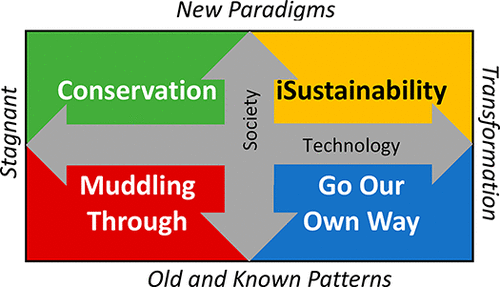当前位置:
X-MOL 学术
›
Environ. Sci. Technol.
›
论文详情
Our official English website, www.x-mol.net, welcomes your
feedback! (Note: you will need to create a separate account there.)
Evolution of the United States Energy System and Related Emissions under Varying Social and Technological Development Paradigms: Plausible Scenarios for Use in Robust Decision Making.
Environmental Science & Technology ( IF 10.8 ) Pub Date : 2018-07-09 , DOI: 10.1021/acs.est.8b00575 Kristen E Brown 1 , Troy A Hottle 2, 3 , Rubenka Bandyopadhyay 3, 4 , Samaneh Babaee 3 , Rebecca S Dodder 1 , P Ozge Kaplan 1 , Carol S Lenox 1 , Daniel H Loughlin 1
Environmental Science & Technology ( IF 10.8 ) Pub Date : 2018-07-09 , DOI: 10.1021/acs.est.8b00575 Kristen E Brown 1 , Troy A Hottle 2, 3 , Rubenka Bandyopadhyay 3, 4 , Samaneh Babaee 3 , Rebecca S Dodder 1 , P Ozge Kaplan 1 , Carol S Lenox 1 , Daniel H Loughlin 1
Affiliation

|
The energy system is the primary source of air pollution. Thus, evolution of the energy system into the future will affect society’s ability to maintain air quality. Anticipating this evolution is difficult because of inherent uncertainty in predicting future energy demand, fuel use, and technology adoption. We apply scenario planning to address this uncertainty, developing four very different visions of the future. Stakeholder engagement suggested that technological progress and social attitudes toward the environment are critical and uncertain factors for determining future emissions. Combining transformative and static assumptions about these factors yields a matrix of four scenarios that encompass a wide range of outcomes. We implement these scenarios in the U.S. Environmental Protection Agency MARKet ALlocation (MARKAL) model. Results suggest that both shifting attitudes and technology transformation may lead to emission reductions relative to the present, even without additional policies. Emission caps, such as the Cross-State Air-Pollution Rule, are most effective at protecting against future emission increases. An important outcome of this work is the scenario-implementation approach, which uses technology-specific discount rates to encourage scenario-specific technology and fuel choices. End-use energy demands are modified to approximate societal changes. This implementation allows the model to respond to perturbations in manners consistent with each scenario.
中文翻译:

不同社会和技术发展范式下美国能源系统及相关排放的演变:用于稳健决策的合理情景。
能源系统是空气污染的主要来源。因此,未来能源系统的演变将影响社会维持空气质量的能力。由于预测未来能源需求、燃料使用和技术采用存在固有的不确定性,因此预测这种演变很困难。我们应用情景规划来解决这种不确定性,制定四种截然不同的未来愿景。利益相关者的参与表明,技术进步和社会对环境的态度是决定未来排放的关键和不确定因素。将有关这些因素的变革性假设和静态假设结合起来,会产生包含多种结果的四种情景矩阵。我们在美国环境保护局市场分配 (MARKAL) 模型中实施这些场景。结果表明,即使没有额外的政策,态度转变和技术转型也可能导致相对于目前的排放量减少。排放上限(例如跨州空气污染规则)对于防止未来排放增加最为有效。这项工作的一个重要成果是场景实施方法,它使用特定技术的贴现率来鼓励特定场景的技术和燃料选择。最终用途能源需求被修改以适应社会变化。此实现允许模型以与每个场景一致的方式响应扰动。
更新日期:2018-07-10
中文翻译:

不同社会和技术发展范式下美国能源系统及相关排放的演变:用于稳健决策的合理情景。
能源系统是空气污染的主要来源。因此,未来能源系统的演变将影响社会维持空气质量的能力。由于预测未来能源需求、燃料使用和技术采用存在固有的不确定性,因此预测这种演变很困难。我们应用情景规划来解决这种不确定性,制定四种截然不同的未来愿景。利益相关者的参与表明,技术进步和社会对环境的态度是决定未来排放的关键和不确定因素。将有关这些因素的变革性假设和静态假设结合起来,会产生包含多种结果的四种情景矩阵。我们在美国环境保护局市场分配 (MARKAL) 模型中实施这些场景。结果表明,即使没有额外的政策,态度转变和技术转型也可能导致相对于目前的排放量减少。排放上限(例如跨州空气污染规则)对于防止未来排放增加最为有效。这项工作的一个重要成果是场景实施方法,它使用特定技术的贴现率来鼓励特定场景的技术和燃料选择。最终用途能源需求被修改以适应社会变化。此实现允许模型以与每个场景一致的方式响应扰动。









































 京公网安备 11010802027423号
京公网安备 11010802027423号